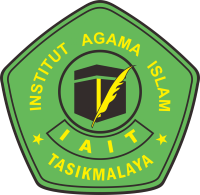Tarbawi's Tafsir as a Philosophical Foundation for Islamic Education
DOI:
https://doi.org/10.61166/kasyafa.v2i1.41Keywords:
Tafsir Tarbawy, Philosophical Foundations, Islamic EducationAbstract
The foundations of Islamic education are the basics that are the main basis for the development of Islamic education. This includes the main sources used as guidelines in Islamic education, such as the Koran and the Sunnah of the Prophet Muhammad SAW. This foundation gives strength and firmness to Islamic education. The philosophical basis of Islamic education is the philosophical study of Islamic education which is based on the Koran, the Sunnah of the Prophet, and the thoughts of the ulama. This also includes social values that do not conflict with Islamic teachings and the legacy of ulama thought. Islamic education originates from divine teachings, and the main sources are the Koran and Sunnah. The goals of Islamic education include the development of a primary personality based on Islamic values and norms. The main goals are to strengthen faith, form noble character, develop religious, scientific knowledge and life skills, as well as understanding the afterlife. This goal directs individuals to become human beings with good morals and contribute positively to people's lives. In accordance with the verse of the Qur'an in QS.Ad-Dhariyat/51:56, the goal of a Muslim's life is to serve and fear Allah. This piety is expressed through worship and devotion to Him as the Almighty Creator
References
Achmad Sudaryo. (2023). Dinamika Pendidikan Islam di Indonesia. INTERDISIPLIN: Journal of Qualitative and Quantitative Research, 1(1), 1–9. https://doi.org/10.61166/interdisiplin.v1i1.1
Anisa. (2024). Pengaruh Lingkungan Sekolah Terhadap Penerimaan Materi PAI di MI Al Ula Balikpapan. Classroom: Journal of Islamic Education, 1(1), 38–54. https://doi.org/10.61166/classroom.v1i1.7
Arribathi, A. H. and Mitrohardjono, M. (2020) “PENERAPAN MANAJEMEN PENDIDIKAN ISLAM (MPI) MENUJU SEKOLAH EFEKTIF”, al-Afkar, Journal For Islamic Studies, 3(1), pp. 35–54. doi: 10.31943/afkar_journal.v3i1, January.83.
Inka Dinda Thiara Qurrotunnisa, & Didik Himmawan. (2023). Community Service Through the Implementation of Islamic Education in Arahan Kidul Village. Community: Jurnal Hasil Penelitian Dan Pengabdian Masyarakat, 2(2), 99–114. https://doi.org/10.61166/community.v2i2.21
Madhar Amin. (2024). Multicultural Education and Its Relevance to the Goals of Islamic Education. ATTAQWA: Jurnal Pendidikan Islam Dan Anak Usia Dini, 3(3), 181–189. https://doi.org/10.58355/attaqwa.v3i3.92
M.R.F. Afra, & M.M.A. Abdullah. (2023). The Concept Of Religious Coexistence In Islām. MAQOLAT: Journal of Islamic Studies, 1(4), 183–194. https://doi.org/10.58355/maqolat.v1i4.22
Muhammad Syaiful Islam. (2024). Islamic Education Thought Seyyed Naquib Al-Attas. Al-Fadlan: Journal of Islamic Education and Teaching, 2(1), 25–36. https://doi.org/10.61166/fadlan.v2i1.39
Nurzahra M, Arianto F, Falihah A, Maharani A. (2023). Dasar Filosofis Pendidikan Islam Dan Tujuan Pendidikan Islam. Fakultas Tarbiyah Institut Agama Islam Nasional (IAIN) LAA ROIBA Bogor.
Saripudin, & Maragustam. (2024). Ibn Sina’s Thoughts on Education and Their Relevance to Contemporary Islamic Education. LECTURES: Journal of Islamic and Education Studies, 3(4), 336–350. https://doi.org/10.58355/lectures.v3i4.112
Tati Kurniawati, & Iskandar Mirza. (2024). The Relevance of Tarbawy’s Tafsir Values in Student Character Education. Kasyafa: Jurnal Pendidikan Agama Islam, 1(2), 90–103. https://doi.org/10.61166/kasyafa.v1i2.23
Downloads
Published
How to Cite
Issue
Section
License
Copyright (c) 2025 Tatang Sholahuddin Ma'ruf, Iskandar Mirza

This work is licensed under a Creative Commons Attribution 4.0 International License.












